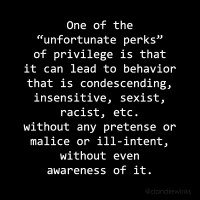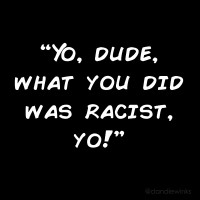Trillin ≠ Racist. Trillin’s Poem = Racist.
 I don’t think Calvin Trillin is racist—I don’t have enough information to definitively conclude that he is a racist person. Knowing that he is a food and humor writer, I have no reason to doubt his honesty in saying that the poem “was simply a way of making fun of food-obsessed bourgeoisie” (his words, according to The Guardian), as opposed to being a racist rant about Chinese people. The poor, doggerel rhythm is supporting evidence that it was is meant as satire.
I don’t think Calvin Trillin is racist—I don’t have enough information to definitively conclude that he is a racist person. Knowing that he is a food and humor writer, I have no reason to doubt his honesty in saying that the poem “was simply a way of making fun of food-obsessed bourgeoisie” (his words, according to The Guardian), as opposed to being a racist rant about Chinese people. The poor, doggerel rhythm is supporting evidence that it was is meant as satire.
That being said, IMO, Trillin’s intent ≠ the actual effect (I think most writers know that this can happen, and that it can happen a lot; one of the benefits of workshopping—and editors?—is figuring this out). I found the poem offensive, and, yes, racist. It’s culturally reductive (food = signifier of culture; and by the by, the doggerel format could also be read as further racism if you take it as making fun of broken-English). This poem may not be as blatant an offense as most things we straight out call “racism,” but… Asian American history + Orientalism + the historical and continued objectification, fetishization, and marginalization of Asians/Asian Americans and their (my) cultures in the Western world.
White, Male, Published, Longstanding NY Times contributor Privilege
I didn’t know he was an 80-year-old white man when I first read the poem. And I still found it offensive. Not enough to start throwing him and the NY Times shade via Twitter or anything, but enough to experience a “what the hell was that?” moment. So no, him being an 80-year-old white man did not make me think the poem was racist (just putting that out there). I also didn’t know he was a food and humor writer who frequently contributed to the magazine until I after I read the poem (good knowledge!).
Though not the sole basis of how I view his work, his background/bio-things do inform my opinion. Knowing he is a food and humor writer who has a book of doggerel, I readily accept his foodie-satire-intentions. Knowing he is a published, accomplished white man… well, it’s easier to inadvertently do/say something racist when you have more checks on the privilege list (in Trillin’s case white, male, published, longstanding NY Times contributor). One of the “unfortunate perks” of privilege is that it can lead to behavior that is condescending, insensitive, sexist, racist, et cetera without any pretense or malice or ill-intent, without even awareness of it.
Check Yourself, Don’t Wreck Yourself
 I’m not judging his privilege (no blame, for real; it’s one of those “just is” things that really is “just is”). But the whole knowledge = power thing. And the whole check your privileges thing. And I don’t mean “check your privileges” in the “check yo self before you wreck yo self” kind of way. I mean, understanding the why’s and how’s that led to a whole bunch of people saying, “Yo, dude, what you did was racist, yo!”
I’m not judging his privilege (no blame, for real; it’s one of those “just is” things that really is “just is”). But the whole knowledge = power thing. And the whole check your privileges thing. And I don’t mean “check your privileges” in the “check yo self before you wreck yo self” kind of way. I mean, understanding the why’s and how’s that led to a whole bunch of people saying, “Yo, dude, what you did was racist, yo!”
We all have privilege (some more than others). We need to accept that privilege informs how we view and act in the world and acknowledge that we can (and do) cause harm, even if unintentional. Then, we need to (or at least should) figure out how we can use our positions of privilege to question, engage, disrupt, expand.
What if Trillin had chosen a different title and ending line than “Have They Run Out of Provinces Yet?” What if he didn’t stop naming actual dishes a third of the way through the poem and kept naming them all the way to the end so that “chow mein” didn’t reverberate so much? What if Trillin’s speaker used “I” instead of “we” (the us vs. them dichotomy)? It’s his writing, yes, and the choices he made were his artistic decisions, but art isn’t made in a vacuum—or maybe it is, and that’s that problem: The vacuum needs cleaning out. (And, yep, I’m aware of the homynym just there.)
Leave a Reply